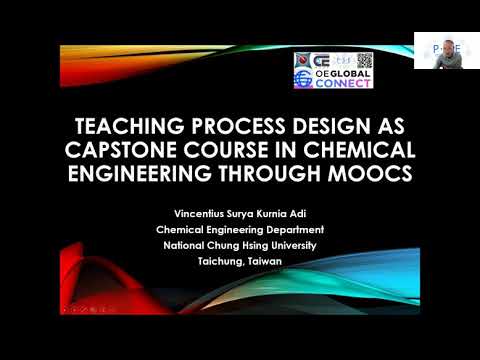Author: Vincentius Surya Kurnia Adi
Institution: National Chung Hsing University
Country: Taiwan
Topic: Innovation through MOOCs practices
Sector: Higher Education
UNESCO Area of Focus: Building capacity
Session Format: Presentation
Abstract
Process engineering focuses on the design, operation, control, and optimization of chemical, physical, and biological processes. Chemical engineers deal with how to do things better and efficiently. The primary aim of Process Design course is on developing the skill of chemical engineers required to work in the process department of an organization and design office of a manufacturing unit. Process Design as capstone course is the embodiment of every chemical engineering subjects, i.e., thermodynamics, mass and energy balance, process control, transport phenomena, etc. Throughout chemical engineering curriculum, opportunities are sought to introduce design approaches and techniques that expose our students to the solution of open-ended design problems, and especially, to present them to widely-used process simulator software package. In Process Design course, the students were provided with the details of the synthesis of process flowsheets and the importance of recycling, among other subjects, using process simulator to perform the extensive calculations. For years, we have offered Process Design for final year senior-level students that introduces the basics of product and process design with design problems in groups of three students. Unfortunately, there is a lack of understanding on unit operations and the skills on implementing simulation software required in Process Design. Therefore, we developed several MOOCs on the process simulator software to increase the students’ exposure and to build students’ capacity in that regard. The MOOCs elaborate the use of process simulator on design applications of classical chemical processes and unit operations, and solids handling. Students will be taught that mass production of any products can only be answered with integrated processes and equipment. Using a flowsheet simulator, students can quantitatively model a chemical processing plant. Students will also learn that a chemical processing plant is comprised of the core reactor unit and different additional unit operations, in the form of pre- and post-treatment steps, as well. Students will be exposed with process simulator technology which is progressively used in petroleum, petrochemical, and chemical industries, at large. Once the student masters such a powerful tool, he/she can use it in his/her daily professional life. Moreover, multilingual subtitles are also included to serve international interests. In this session, we would share our experience on teaching capstone course and the corresponding tools to achieve the learning objectives. The audience will be able to learn on incorporating MOOCs to teach licensed software, remote connections, and interactive presentation, for strengthening students’ capacity. The potentials of MOOCs utilization for flipped learning and problem based learning are also elaborated.Keywords
process design, process simulation, chemical engineering
